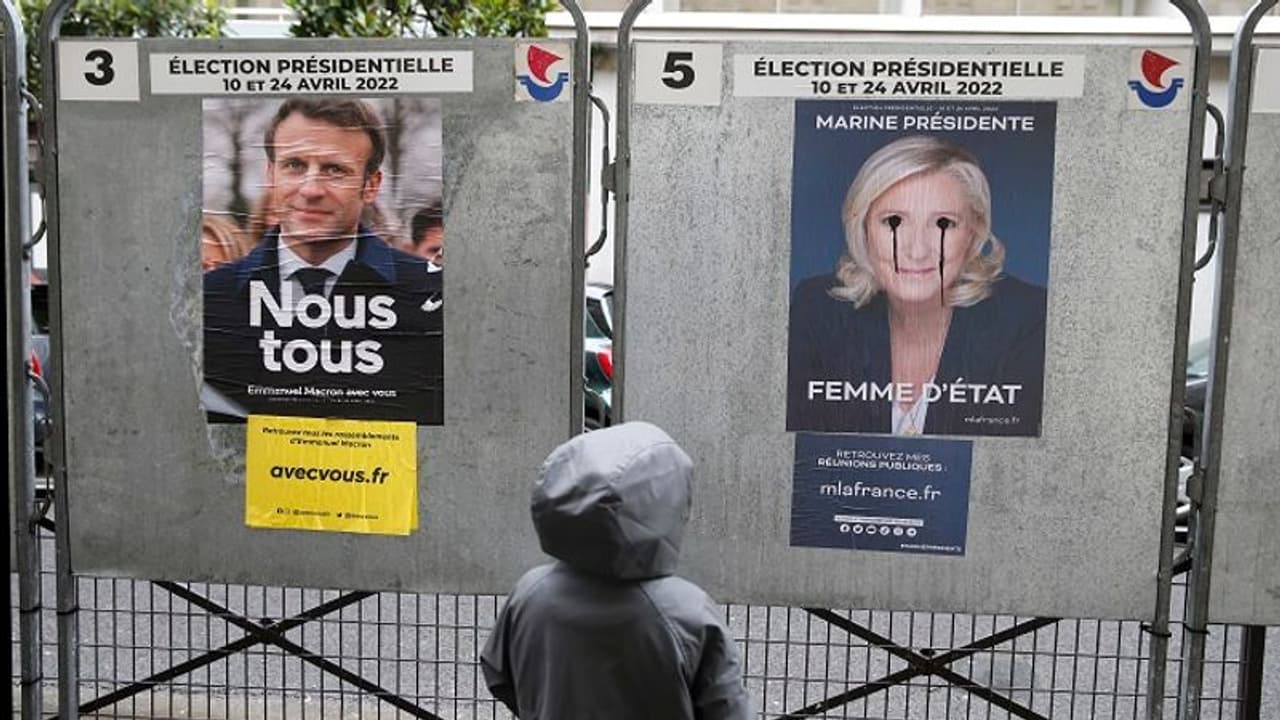On April 24, France will vote on whether to re-elect the pro-business centrist President Emmanuel Macron or defy decades of mainstream agreement favouring far-right Marine Le Pen.
On April 24, France will vote on whether to re-elect the pro-business centrist President Emmanuel Macron or defy decades of mainstream agreement favouring far-right Marine Le Pen.

Listed below are the key issues to anticipate from both leaders:
On Economy:
Marine Le Pen - The far-right heiress has converted the erstwhile National Front turning her father's free-market, small-government party into a huge-spending, protectionist one.
She desires to introduce a "Buy French" scheme for public tenders, cut the lowest retirement age to 60 for those people who started working before the age of 20, eliminate income tax for those under the age of 30 and cut VAT on energy from 20 per cent to 5.5 per cent.
She plans to spend 2 billion euros ($2.18 billion) in 5 years to increase hospital workers' wages and hire more than 10,000 heads. Salaries of teachers to raise by 15 per cent in 5 years.
A political scientist at Sciences-Po, Gilles Ivaldi, stated that her party's economic policy is more left-wing than in decades.
Emmanuel Macron - Emmanuel Macron desired to expand on the supply-side reforms he executed in his first term, with the primary plank of his manifesto being to raise the minimum pension age to 65 from 62.
On 15-20 hours of training, the leader promises to make some welfare benefits conditional, equal to policies existing in countries including the United States or Britain.
Unemployment insurance, which presently covers up to two-thirds of a worker's pay for two years if they lose their job, would be tied to the economy's strength.
To stay loyal to his "neither left nor right" motto, he has also vowed to make benefits automatic for those who qualify rather than requiring applicants to apply.
On Europe:
Marine Le Pen - Despite Le Pen ditching her previous plans to exit the Euro and pay France's debt in freshly formed francs, she has committed to reducing contributions to European Union coffers. An action like this would put Paris at odds with the European Commission and other EU nations.
In a challenge to the EU's highest court, she declared that she believes French law should take precedence over EU laws and that she wants to replace the EU with a 'Europe of states,' though she has yet to clarify what that would mean.
Le Pen will also hire thousands more customs agents to verify the products entering France, including those from the EU countries, to combat fraud. As per analysts, this would jeopardise the single market.
Emmanuel Macron - Macron will stress developing, as per him, Europe's "strategic autonomy" in defence, agriculture, technology and energy and reduce the bloc's reliance on other powers.
In the last five years, Macron has attempted to re-orient the EU toward a more protectionist stance, blocking a few free-trade deals with other blocs, including Mercosur and developing a process that intensifies the examination of foreign takeovers of strategic EU enterprises.
He is expected to push for more regulation of US tech giants and has stated he desires to establish a "European metaverse" to compete with Facebook.
On Western Ties:
Marine Le Pen - In a challenge to the post-Cold War security architecture of the West, Le Pen desires to remove France from the transatlantic military alliance NATO's integrated command.
The opposition accused her of having close links to Moscow. In 2014, her party secured a bank loan from a Russian bank; also, shortly ahead of the 2017 presidential election, she was invited by Russian President Vladimir Putin to the Kremlin.
She has opposed Russia's invasion of Ukraine; however, she stated that Moscow might become an ally after the war.
While an interview with Reuters, she describes herself as a "Gaullist" after wartime, Charles de Gaulle said she would pursue a foreign policy that was equal distance from Washington and Moscow.
"Drop any preconceived ideas you have about me," she replied when asked if she had a message for France's traditional allies, Britain and the United States.
Emmanuel Macron - Although Marcon ruffled feathers throughout the trans-Atlantic alliance, particularly in eastern Europe and Germany, when he labelled NATO "brain-dead" in 2019, he has since declared the Russian invasion of Ukraine had "jolted it back to life".
Nonetheless, he would work to reduce Europeans' reliance on the US military for security.
Macron stressed the EU to aim more on the Indo-Pacific and China's increasing influence in the region. However, he disagreed with Washington, London and Canberra after Australia backed out of a huge submarine agreement with France.
He's been unsure whether he'll join the new US-UK-Australia security coalition, called AUKUS, against China or try to encourage the EU to follow its own independent strategy toward Beijing.
Also Read: 'Unbearable scenes': Macron on Russian troop's atrocities, support new sanctions
Also Read: Globally 490 million covid-19 cases reported, New variant XE raise new concerns
Also Read: Ukraine to bestow 'Peace Award', Pope Francis appeals for peace, more | Top updates
